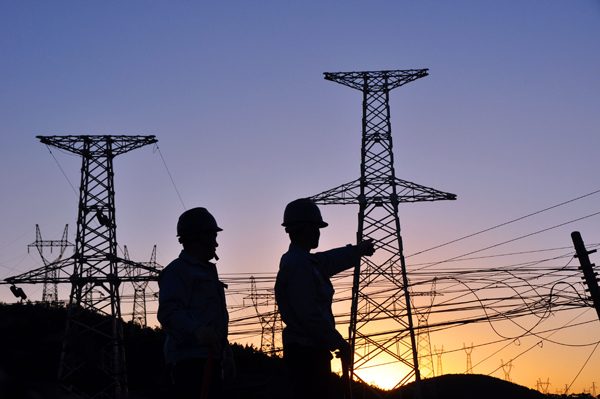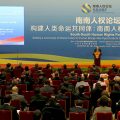
|
Employees of a power supply company in Weining county, Guizhou province, check power transmission facilities. [Photo/Xinhua] |
China Southern Power Grid Co Ltd will add another two major power lines to its east-west electricity network by 2020, which are expected to increase transmission capacity by 55 percent, the company said on Tuesday.
The utility company said as a result the grid will be able to meet an extra power load equal to the combined amount in Guangzhou and Shenzhen, the two biggest cities in southern China’s Guangdong province.
The infrastructure rollout is part of a national program to transmit electricity from China’s resource-rich west to its energy-thirsty east.
China Southern Power Grid said it had already constructed 17 major power lines to transmit electricity from Yunnan and Guizhou provinces and the Guangxi Zhuang autonomous region to southern China, especially the Pearl River Delta region.
The utility firm said the program will not only optimize the allocation of resources, but also improve air quality by making full use of the clean energy resources in the west including Yunnan’s hydropower infrastructure.
Water inflows into Yunnan’s rivers last year were 20 percent above the previous year, adding 28 billion kilowatt-hours to its hydropower generating capacity, but the province’s demand for electricity did not increase.
To encourage electricity buyers in Guangdong to consume more hydropower from Yunnan, the Guangzhou Power Exchange Center removed a cap on trading volumes for Yunnan’s hydropower and reduced power prices during the wet season.
“By speeding up building power transmission channels and reforming the electricity exchange mechanism, we can optimize the allocation of resources and adjust the structure of power consumption,” said Li Qingkui, chairman of China Southern Power Grid.
“We will keep electricity generated by clean energy resources above 50 percent of total generating capacity in Guangdong, Hainan, Yunnan, Guizhou and Guangxi,” Li added.
The utility company said that electricity generated by non-fossil fuels reached more than half of total generating capacity for the first time in the five provincial-level regions by the end of 2016, at almost twice national average levels.
The company said it transmitted 195.3 billion kw/h of electricity through its east-west power lines in 2016, achieving sustained growth of five years in a row.


